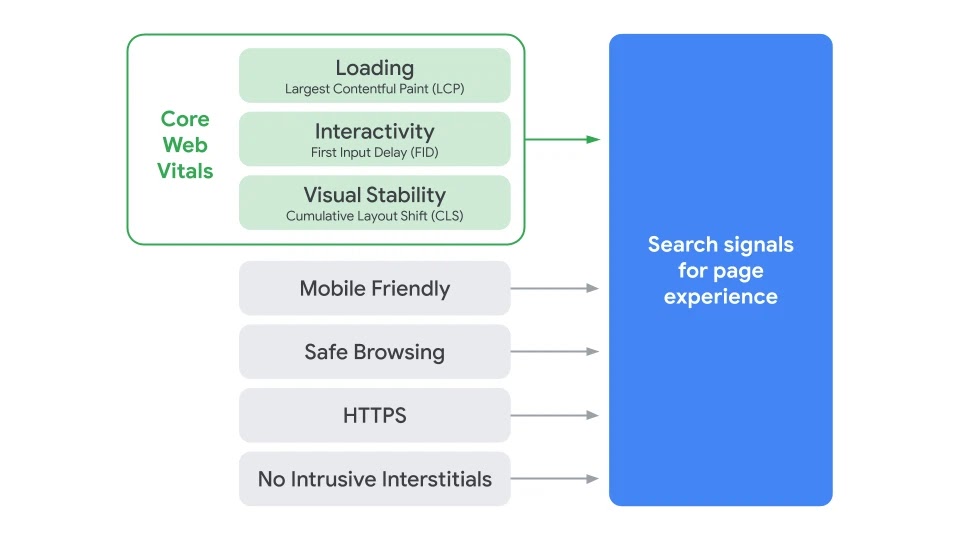Google is Updating Its Algorithm, Again
In May 2020, Google announced it would include page experience signals in its search engine ranking factors. Then in November, it announced the update would go live in May 2021. As that date is quickly approaching, we thought it would be a good time to re-cap what the change is and what it means for real estate websites specifically. Read on to learn more about how Google plans to highlight great user experiences even more and whether your real estate website will benefit from this change.
First, Some Background
Google first announced their upcoming page experience update in May 2020. At that time, like so many of us, they were trying to make sense of and adapt to the COVID-19 pandemic and how quickly and dramatically our behavior changed. They were also facing an election year unlike any other and heightened awareness of the ability to spread falsehoods online. You can read their COVID-19 Marketing Strategy Playbook here to get a sense of the multitude of trends they were grappling with and advising businesses on. The report highlights how consumers are:
- Using multiple devices to go online at unprecedented levels
- Searching for critical information and content to meet essential needs
- Discovering new connections and nurturing relationships (virtually)
- Adjusting routines to be internet-first
- Practicing self-care – and being there for others
Months later, these trends have become norms and that’s why Google is making this algorithm update – because the amount of content we are all consuming online and how we are consuming it continues to grow at an incredibly fast pace and Google’s business model depends on being able to help the businesses that use its services continue to acquire new customers online. It also makes a lot of sense. Some of Google’s past algorithm updates and standards, such as AMP pages, required more heavy lifting from content creators and publishers. Prioritizing the user’s experience is what Google has been doing for a decade, all the way back to the first Panda update in 2011. Keep in mind that the Page Experience Update is one update of literally thousands (though many are minor tweaks and more limited experiments) and other ranking factors, like your website’s popularity and relevance to the user’s search, will likely remain more influential in determine your website’s search engine ranking; however, optimizing your website for the new page experience signals will be key to getting the most out of your SEO strategy for real estate.
What is Google’s Page Experience Update?
Google’s new page experience update involves a set of signals that Google will be using to determine whether a website offers its users a great browsing experience. The update combines Google’s Core Web Vitals measurements with current Google search ranking factors including mobile-friendliness, safe-browsing, HTTPS-security, and banning intrusive interstitials. It is unclear the weight each of this signals will have in determining each website’s overall page experience score. Google has said that it will be using an object based approach that gives sites credit for meeting all of their criteria and adhering to best practices for each ranking factor.

Source: Google
Core Web Vitals, Explained
Core Web Vitals are a set of metrics that represent the loading, interactivity, and visual stability of your website (how fast is your site, how easy is it to use, and how appealing is it). They’re what Google has deemed critical components of great user experiences and you should aim to be in at least the 75th percentile for each. There are three signals in particular that are part of the new Page Experience signal. They include:
- Largest Contentful Paint (LCP) – measures loading performance
- First Input Delay (FID) – measures interactivity
- Cumulative Layout Shift (CLS) – measures visual stability
Put simply, Core Web Vitals are the best available signals developers – and Google – have to measure the quality of a web experience. Core Web Vitals are relevant to all pages across a website, while emphasizing a website’s overall user experience.
How to Prepare
Google’s page experience update will almost certainly affect SEO for real estate. Google has already been evaluating sites using many of the Core Web Vitals and page experience signals, and by replacing some signals like AMP with the page experience update, they’re giving the page experience signals more weight. As Google’s blog post says, Google will “prioritize pages with great page experience, whether implemented using AMP or any other web technology, as we rank the results.” Additionally, Google is testing visual indicators that will appear next to search results to highlight pages that have met all of Google’s page experience criteria. Google will likely be getting rid of the AMP indicators in favor of the page experience indicators, but what they’ll look like is still unknown.
We do know that Google is seeking to make it as easy as possible to let users know which websites meet its criteria, through both better search engine ranking and through visual indicators, and you want your website to be featured. Therefore, double check how your website performs on Google Lighthouse and through PageSpeed Insights. Pay particular attention to how your website performs on Google Chrome and on Android devices, which are used most by Google to crawl websites. Consider installing a Chrome plugin like Ubersuggest to help you or work with a company like Union Street Media to develop a SEO strategy for you. Specific recommendations may include:
- Optimizing your page speed
- Reducing server errors, such as 404s, and limiting 301 redirects
- Using a heat mapping tool like CrazyEgg to understand how your users interact with your site
- Modifying your main navigation and header elements
- Optimizing your images
- Adapting your website for mobile to provide the best user experience possible
You can always connect with our team to get personalized recommendations on where to focus first, or to discuss what they’re seeing in your Google Analytics. Don’t wait to optimize your website for Google’s page experience search signals – the update will be here soon!











